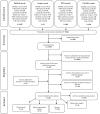Smoking cessation interventions on health-care workers: a systematic review and meta-analysis
- PMID: 32587807
- PMCID: PMC7304418
- DOI: 10.7717/peerj.9396
Smoking cessation interventions on health-care workers: a systematic review and meta-analysis
Abstract
Objective: The authors carried out a systematic review and a meta-analysis on smoking cessation interventions on health -care workers to clarify the state of the art interventions and to identify the best one.
Materials and methods: This review was registered with PROSPERO: CRD42019130117. The databases PubMed, Scopus, Web of Science and CINAHL were searched until December 2018. Quality of all studies included in the systematic review was assessed according to the Newcastle-Ottawa Scale (NOS) on cohort or cross-sectional studies and to the Cochrane Risk of Bias Tool for Randomized Controlled Trials. Meta-analysis and meta-regression analyses were also carried out for cohort studies (quasi-experimental or a before-after studies design) and clinical trials.
Results: Twenty-four studies have been included in the analysis: four before-after, 13 cross-sectional, three quasi-experimental studies and four clinical trials. Articles were heterogeneous (P for homogeneity <0.01), but they have all shown positive results since they reached the goal of smoking cessation among health-care workers, even if with different proportions. Meta-analysis was performed on 10 studies (six cohort studies and four clinical trials), showing a 21% of success rate from the application of smoking cessation interventions, either pharmacological or behavioral ones. The resulted pooled RR (Risk Ratio) was 1.21 (95% CI [1.06-1.38]), being 24% of success rate from clinical trials (pooled RR 1.244; 95% CI [1.099-1.407]) and 19% of success rate from cohort studies (pooled RR 1.192; 0.996-1.426). However, two studies have confidence intervals which include unity and one study has a wide confidence interval; as a consequence, the meta-analysis for its results depends heavily on one single study. Meta-regression analysis revealed that results were influenced by the number of participants.
Conclusion: Both policy and pharmaceutical interventions can obtain positive results in quitting smoking among health-care workers. However, as shown by our review, combination approaches can produce better results in terms of cessation percentages and smoking abstinence.
Keywords: Health-care workers; Interventions; Meta-analysis; Smoking cessation; Systematic review.
©2020 La Torre et al.
Conflict of interest statement
The authors declare there are no competing interests.
Figures
Similar articles
-
Effectiveness of smoking cessation on the high-risk population of lung cancer with early screening: a systematic review and meta-analysis of randomized controlled trials until January 2022.Arch Public Health. 2023 Jun 3;81(1):101. doi: 10.1186/s13690-023-01111-5. Arch Public Health. 2023. PMID: 37268972 Free PMC article.
-
The future of Cochrane Neonatal.Early Hum Dev. 2020 Nov;150:105191. doi: 10.1016/j.earlhumdev.2020.105191. Epub 2020 Sep 12. Early Hum Dev. 2020. PMID: 33036834
-
Tailored Web-Based Smoking Interventions and Reduced Attrition: Systematic Review and Meta-Analysis.J Med Internet Res. 2020 Oct 19;22(10):e16255. doi: 10.2196/16255. J Med Internet Res. 2020. PMID: 33074158 Free PMC article.
-
Digital interventions for smoking abstinence: a systematic review and meta-analysis of randomized control trials.J Addict Dis. 2023 Jan-Mar;41(1):4-29. doi: 10.1080/10550887.2022.2058300. Epub 2022 Apr 15. J Addict Dis. 2023. PMID: 35426355
-
Meta-analysis of the effectiveness of smoking cessation interventions in community pharmacy.J Clin Pharm Ther. 2014 Jun;39(3):240-7. doi: 10.1111/jcpt.12131. Epub 2014 Jan 13. J Clin Pharm Ther. 2014. PMID: 24749899
Cited by
-
Maternal smoking and alcohol use in association with breastfeeding initiation, duration, and infant health - a scoping review.Womens Health (Lond). 2025 Jan-Dec;21:17455057251352297. doi: 10.1177/17455057251352297. Epub 2025 Aug 19. Womens Health (Lond). 2025. PMID: 40827689 Free PMC article. Review.
-
A Qualitative Investigation of Staff Feedback on an Online Learning Module on Smoking Cessation in a German Healthcare Company.Healthcare (Basel). 2023 Jun 16;11(12):1774. doi: 10.3390/healthcare11121774. Healthcare (Basel). 2023. PMID: 37372892 Free PMC article.
-
Tobacco use and readiness to treat tobacco users among primary healthcare professionals in Soweto.S Afr Fam Pract (2004). 2024 Oct 29;66(1):e1-e11. doi: 10.4102/safp.v66i1.5996. S Afr Fam Pract (2004). 2024. PMID: 39494660 Free PMC article.
-
Prevalence and correlates of anxiety and depression in frontline healthcare workers treating people with COVID-19 in Bangladesh.BMC Psychiatry. 2021 May 25;21(1):271. doi: 10.1186/s12888-021-03243-w. BMC Psychiatry. 2021. PMID: 34034679 Free PMC article.
-
Smoking Habits and Workplace Health Promotion among University Students in Southern Italy: A Cross-Sectional Pilot Investigation.Int J Environ Res Public Health. 2022 Aug 27;19(17):10682. doi: 10.3390/ijerph191710682. Int J Environ Res Public Health. 2022. PMID: 36078398 Free PMC article.
References
-
- Agusti A, Estopáb R, González J, Guerrad D, Marín D, Roig P, Salvador T, Sánchez L, Sobradillos V, Bartletth A, Estruch J. Estudio multicéntrico de la deshabituación tabáquica con chicle de nicotina en personal sanitario. Medicina Clinica. 1991;97:526–530. - PubMed
-
- Bakan A, Erci B. Comparison of the effect of trainings based on the transtheoretical model and the health belief model on nurses’ smoking cessation. International Journal of Caring Science. 2018;11:213–224.
-
- Cook TD, Campbell DT. Quasi-experimentation: design & analysis issues in field settings. Houghton Mifflin; Boston: 1979.
LinkOut - more resources
Full Text Sources



